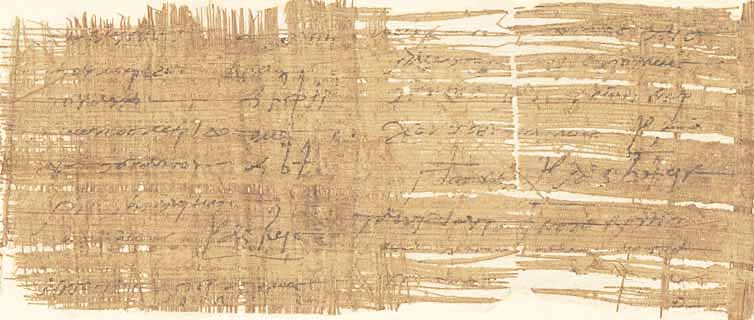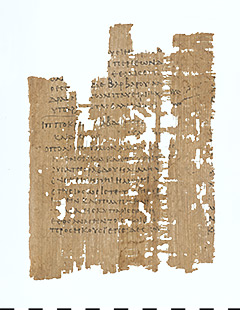BKT IX 38 (P. 6934 V + P. 21137 V)
The conflict between wisdom and power is an old topic. It is therefore not surprising that stories of many famous wise women and men have been handed down in which such conflicts are reported. A fragmentary example can be found on some papyrus fragments in the Berlin Papyrus Collection.
Not only medical texts have survived under the name of the famous Greek physician Hippocrates of Kos. Letters from him also circulated in antiquity. They purport to be part of his correspondence and could therefore provide valuable insights into Hippocrates‘ thoughts and actions. However, due to many anachronisms, they must be labelled as fictitious and therefore pseudo-Hippocratic. These letters deal with the theme of the conflict between power and wisdom and show the moral superiority of the ideal physician Hippocrates. There are several versions of many letters with the same content but of different lengths. They have been handed down in medieval manuscripts and have also been preserved in copies on some papyri from Roman Egypt.
The verso (back) of several fragments of a scroll written on both sides contains the remains of some of these letters. Fragments of a document from the second century AD are preserved on the recto (front). The letters on the verso can therefore be dated somewhat later. The papyri originate from the Faijum, a large oasis south-west of Cairo, later belonged to the private collection of the Egyptologist Heinrich Brugsch and came to the Berlin Papyrus Collection in 1891.
In the first letter that has survived on these papyri, the physician is informed by the Persian governor Hystanes on the Hellespont about the offer of the Great King Artaxerxes to come to his court in Persepolis to work there as court physician. In the letter that immediately follows, Hippocrates rejects this offer on the grounds that he would not heal enemies of the Greeks. The rest of the known correspondence on this subject is not reproduced on this papyrus. Instead, it is followed by a letter from Hippocrates containing a reply to a petition from the council and people of the Greek city of Abdera in Thrace, which is also not reproduced here. The doctor promises to help the Abderites by curing the famous philosopher Democritus, who was supposedly suffering from madness. Alluding to his correspondence with the Persians, he refuses any payment.
The combination of these two correspondences makes the theme of the conflict between power and wisdom very clear. While Hippocrates refuses to help the powerful Persian king, immediately afterwards he offers his help to the small Greek town of Abdera for the sick, wise fellow citizen Democritus.
The individual letters were separated on the papyrus by paragraphoi (horizontal lines at the beginning of a line). Such a paragraphos is still clearly visible above the seventh line. The greeting formula and the beginning of the letter are written in ecthesis (hanging indentation) and were also marked in this way.
Due to the reuse of the papyrus scroll and the inscription of the verso with this text, it is probably a private copy of these letters, which were presumably compiled under the aforementioned theme of the conflict between power and wisdom.



